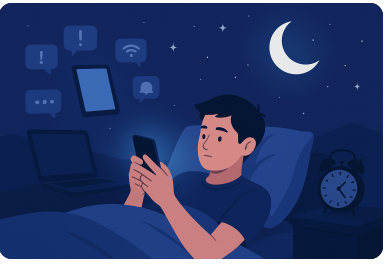In today’s always-connected world, technology plays a huge role in how we live, work, and relax. While our devices bring convenience and entertainment, they can also disrupt one of the most important aspects of our well-being: sleep. The OneFramework 6 ways technology affects your sleep health guide highlights the main reasons why using gadgets before bed can harm your rest, along with practical tips for improving your nightly routine.
Sleep isn’t just about closing your eyes — it’s about allowing your mind and body to recharge. Poor sleep caused by technology can lead to fatigue, mood swings, and even long-term health problems. Let’s explore the science behind this connection and break down each of the six ways technology impacts your sleep.
Understanding the Science Behind Sleep
Sleep follows a natural cycle, typically moving through light sleep, deep sleep, and REM (rapid eye movement) stages. During deep sleep, your body repairs tissues, strengthens the immune system, and consolidates memories. A key player in this process is melatonin, a hormone that regulates the sleep-wake cycle, also known as the circadian rhythm.
Technology can disrupt this natural rhythm in multiple ways — from bright screen light to constant notifications. Even small interruptions can throw off your body’s internal clock, making it harder to fall asleep and stay asleep.
1. Blue Light Exposure
One of the biggest culprits is blue light, a type of high-energy visible light emitted by screens on smartphones, tablets, laptops, and TVs. According to sleep research, blue light suppresses melatonin production, which delays your brain’s signal to rest. This makes it harder to fall asleep and can reduce the amount of deep sleep you get.
For example:
- Watching videos on your phone before bed can keep your brain alert.
- Checking emails late at night may trick your body into thinking it’s still daytime.
Tip: Use blue light filters, “night mode” settings, or special glasses that block blue light. Better yet, switch to non-screen activities an hour before bed, like reading a paper book.
2. Overstimulation and Mental Alertness
Technology often keeps the brain in a state of high activity. Whether you’re gaming, scrolling social media, or binge-watching a series, the stimulating content keeps your mind alert when it should be winding down. This delays the natural transition into sleep mode.
Imagine you’re playing a competitive online game just before bed — your heart rate increases, adrenaline spikes, and your brain remains engaged long after you put the controller down. Over time, this can make it harder to relax and get quality rest.
3. Constant Notifications and Disruptions
Even if you fall asleep quickly, constant pings, vibrations, or screen flashes can break your sleep cycle. Each interruption pulls you out of deep or REM sleep, leading to lighter, less refreshing rest.
Common examples include:
- Social media alerts
- Late-night text messages
- App notifications
Tip: Use “Do Not Disturb” mode or leave devices outside the bedroom to avoid unnecessary wake-ups.
4. Dependency and Habit Formation
For many people, using technology at night becomes a habit. Whether it’s scrolling through news feeds, streaming videos, or online shopping, these activities make the bedroom feel like a space for stimulation instead of rest.
Breaking this habit can be challenging because the brain starts associating the bed with wakeful activities rather than sleep. Over time, this can lead to insomnia and reduced overall sleep quality.
5. Anxiety and Sleep Disorders
Technology can increase anxiety levels, especially when it involves constant connectivity. Fear of missing out (FOMO), stressful news updates, or work emails can keep your mind racing at night. Prolonged anxiety disrupts your ability to fall into deep sleep and can trigger insomnia.
Using relaxation techniques, such as guided meditation apps (ironically, a healthy use of technology), can help calm the mind before bed.
6. Reduced Time for Sleep
Finally, one of the most obvious yet overlooked effects is simply losing track of time. The endless scroll of social media or autoplay on streaming platforms can push bedtime later and later. Even losing an hour of sleep regularly can cause noticeable fatigue, irritability, and reduced productivity during the day.
Summary Table – OneFramework 6 Ways Technology Affects Your Sleep Health
| No. | Effect of Technology | How It Affects Sleep | Possible Solutions |
|---|---|---|---|
| 1 | Blue Light Exposure | Suppresses melatonin, delays sleep onset | Use blue light filters, avoid screens before bed |
| 2 | Overstimulation | Keeps brain active, delays relaxation | Set a digital curfew, choose calm activities |
| 3 | Notifications | Interrupts deep sleep | Activate Do Not Disturb, keep devices away |
| 4 | Habit Formation | Associates bed with wakefulness | Make bedroom a screen-free zone |
| 5 | Anxiety & Stress | Prevents deep sleep, causes insomnia | Practice mindfulness, avoid stressful content |
| 6 | Reduced Sleep Time | Pushes bedtime later | Set bedtime alarms, limit screen use |
Long-Term Effects of Poor Sleep from Technology
If these patterns continue, the long-term consequences can be serious. Poor sleep has been linked to weakened immunity, memory problems, weight gain, and even cardiovascular disease. It can also increase the risk of depression and anxiety disorders.
Creating a Healthy Technology-Sleep Balance
To combat the issues outlined in the OneFramework 6 ways technology affects your sleep health, try these strategies:
- Establish a screen-free hour before bedtime.
- Use calming activities like light stretching, meditation, or reading.
- Keep devices out of arm’s reach during sleep.
- Maintain a consistent sleep schedule.
Conclusion
Technology is deeply woven into our daily lives, but without healthy boundaries, it can harm our sleep health. The OneFramework 6 ways technology affects your sleep health highlights the main issues, from blue light to bedtime scrolling, and offers simple solutions for better rest. By making small but consistent changes to your nighttime habits, you can protect your sleep quality, boost your health, and wake up feeling truly refreshed.
Related Articles
Depression Explained: Signs, Treatment, and When to Seek Help
The Importance of Mental Health in the Workplace
How Sleep Affects Your Mental Health
Mindfulness and Meditation: Tools for Better Mental Well-being

